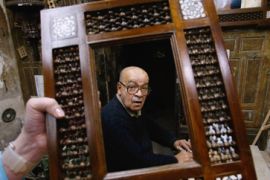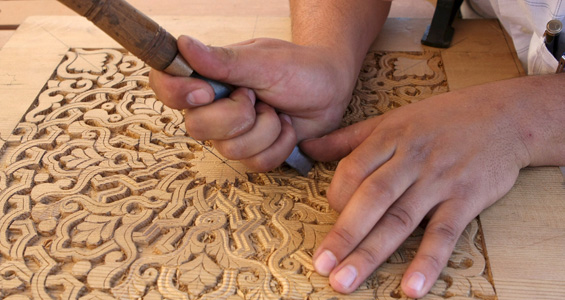Signs of recovery in Egyptian town
Residents say increased consumer confidence is reviving local businesses.

 |
| Adliya’s craftsmen are starting to return to work [EPA] |
Al Jazeera has been following the effects of the global recession on towns across the globe.
Two months after first observing the impact of the global recession on Damietta in Egypt, Rawya Rageh returned to see if there are any signs of recovery.
The people of Adliya are beginning to breathe a sigh of relief. After months of feeling the pinch as a result of the global economic downturn, things are easing in this northern Egyptian village and residents are cautiously welcoming the change.
“The market has picked up again. The wheel is turning and more orders are coming in,” said 42-year-old carpenter Youssef Zeyara.
Adliya, like many of the hundreds of villages that make up the province of Damietta, is heavily dependent on the furniture industry.
Today, it is the fourth-largest industry in the country, with investments in the field reaching $2bn.
Craftsmen laid off
During our previous visit to the village in March, many workshops, including Zeyara’s, were closed.
| In depth |
|
|
The lathe in Zeyara’s workshop had been idle for fourth months at that point and his two craftsmen had been sent home.
Woodworkers complained then that merchants had cut orders by half, that the wood they were getting was of bad quality and that both local demand and exports were dwindling.
“One month after you visited me the last time, merchants called and said I should start stocking up on raw material because I’ll soon have to re-open. So I called back the craftsmen.
“At the beginning it was slow, but now the workshop is operating all day long with two shifts,” Zeyara said.
Government efforts
In an effort to ease the effects of the slowdown, the Egyptian government cut duties on imported capital goods and raw materials that are not produced locally yet are crucial to national industries.
The move has seen tariffs slashed on items, like wood, that are key to the furniture industry.
| IN VIDEO |
|
|
| Adliya’s furniture makers see slight recovery |
More Videos… |
Egypt’s official press reported in mid-May that backdated refunds of up to $54m were given to various importers as part of the government’s stimulus package.
Such government efforts, in addition to a gradual recovery in consumer confidence, are among the factors that have revived Adliya’s economy.
Another key factor, say the locals, is the “season”.
“I’m a simple man, I can’t explain the economics behind the change, but I can tell you summertime has usually been a better time for us. We call it a special season,” said woodworker Bahaa Khalil.
“Traditionally, weddings pick up in the summer and demand increases on furniture to set up new homes.”
Optimism
A few months ago, Bahaa was complaining that he had had to let go of some of the craftsmen who meticulously cut, shape and carve ornate furniture.
Now he is optimistic that he may be able to pay his workers full pay again – although he is quick to stress that “business is not exactly back to normal levels”.
While business may not be back to pre-recession levels, the mood is lighter in Adliya.
As you walk around the village, the doors of the workshops are wide open and the craftsmen inside are busy carving wood. It is a far cry from the last time we visited, when the workshop doors were bolted closed.
One positive sign, Zeyara says, is the fruit vendor, who is now back in his usual spot on the street corner.
“On weekends now, you see people going back home carrying all sorts of fruits – that’s always a good sign,” he said.
“I brought home fruit for the first time in months.”

 A special report on the economic crisis
A special report on the economic crisis